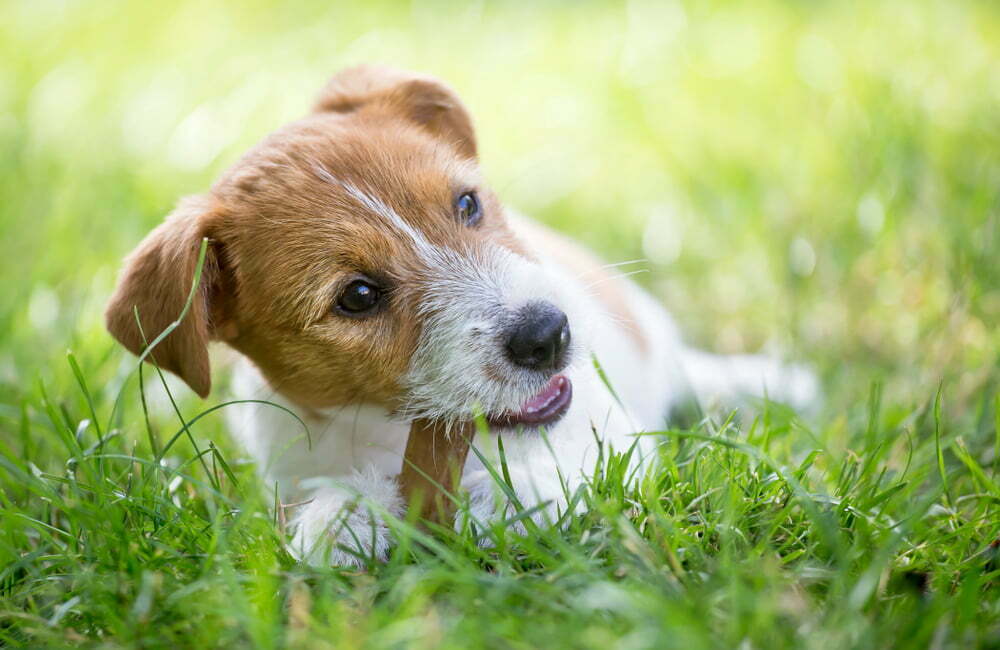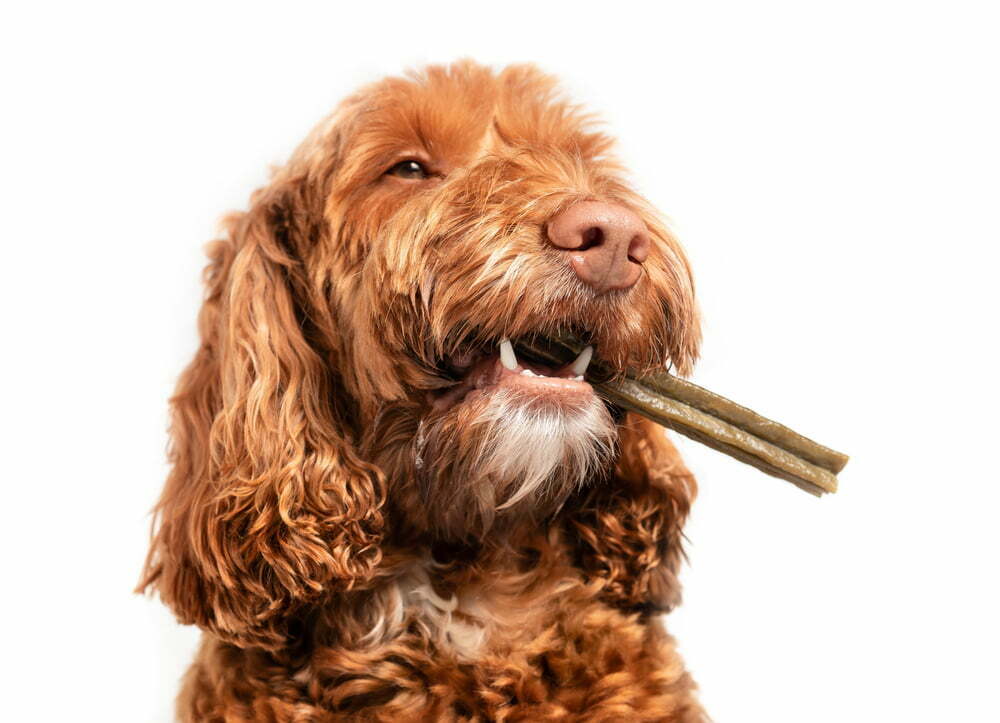
All dog’s love bones, even puppies but, are they safe for your little friend? Puppies will have much smaller jaws and softer teeth than adult dogs, especially when they still have their baby teeth.
So, when is it okay to feed your puppy a bone, and when should it be avoided? Feeding bones to dogs is a pretty controversial subject and pet owners often have differing views on what’s safe and what’s not.
While there is no right or wrong answer to the bone issue, it’s a good idea to understand all the facts before you decide what you’re going to do with your dogs.
Puppies are not born with a full set of adult teeth so the first thing you need to know if when these grow in.
Dogs are not born with baby teeth, much like humans, but by the time they reach about three weeks old they will start to grow and will lose them again by the time they are three months and start growing adult teeth.
A lot of people believe after around the three-month mark, your puppy will be safe to chew on a bone, but this is not official advice.
Consider speaking to your vet about it before you decide to give your puppy a bone. Depending on their breed and size, the vet may advise against it for another month or two.
In this article, I will provide you with all the information you need to help you decide on whether you want to feed your dog bones, including the advantages, dangers and alternatives.
Keep reading to find out!
What age does my puppy need to be to eat bones?
There is no specific age your puppy needs to reach before being able to chew bones safely. It really depends on the size and breed of dog more than anything.
That being said, you should at least wait until your puppy’s adult teeth have grown in, so they will be strong enough to take on a bone.
Your puppy should also be at least one month post-weaning before being given a bone to eat.
Please do keep in mind though, that not all bones are safe for puppies or fully grown dogs, and it’s important to know the difference to avoid any pain and suffering for your dog in the future.
What bones are safe to give to my puppy?
First things first, it is recommended that any bones you give your puppy should be at least the size of their head and have rounded edges. This is because smaller bones will be easily swallowed, and brittle edges can break off in your puppy’s mouth easily, putting them at risk of internal cuts.
Below is a list of bones that are safer for your pup to chew:
● Uncooked bones – raw is always better. This is because a cooked bone will be softer and more likely to break or fracture which can result in internal bleeding and cuts within your puppy’s digestive tract. So, the go to your local butchers to get your dog a nice raw bone to chew on. In order to avoid putting your dog at risk of ingesting bacteria such as salmonella, make sure you or the butcher thoroughly wash the bone before feeding it to your dog
● Beef Bones – cow bones are perfect for your pup because they’re big and very dense making them very difficult to break and be swallowed by your pup
● Lamb Bones – the next best thing, lamb bones are also pretty safe to feed your puppy. They are also quite large and dense like beef bones and are just as easy to obtain from your local butcher
● Large bones – the bigger, the better when it comes to bones. The less likely it is for your pup to choke or swallow on it, the safer it is for them to chew.
So, stay away from smaller bones from animals like chickens and other poultry or ribs. These can easily break when your dog bites into them which can then be swallowed and cause damage. Make sure the bone is as big as your pup’s head.
Other bones to avoid include frozen bones. These can be harmful to your dog’s oral health. You can freeze fresh bones to store them, but they must be fully thawed before you let your furry friend get their paws on them.
How do bones benefit puppies and dogs?
There are tons of benefits of treating your pup to a tasty bone. As long as you give them the right ones, benefits can include:
● Helps with teething
Your little pup will be dealing with horrible teething pains for up to eight months of age so the more ways you have to help soothe those pains the better.
Chewing on a juicy bone will help to satisfy their desire to chew while massaging their sore gums.
You can of course give them lots of chew toys to help with this but, they can quickly get bored and/or destroy toys so having a bone to give them as a backup is a good idea.
● Stops them chewing your household items
Going on from the previous point, giving your puppy a bone to chew on will distract them from taking out their need to chew on your lovely furniture and shoes!
Bones typically last much longer than chew toys, so they should be kept occupied for longer. Plus, they taste much better.
● Delicious and nutritious
Bones are not only super satisfying to chew, they’re actually a great source of calcium to help your pup grow up big and strong with healthy bones.
The bone marrow contains iron, fats, proteins and antioxidants known to maintain dogs’ overall health. Consuming healthy fats and proteins as well as iron and antioxidants have been known to enhance the appearance of a dog’s fur and support strong skeletal development.
● They clean your dog’s teeth
Chewing on bones helps to naturally remove tartar from your dog’s teeth. This is important because dogs can quickly build up tartar on their teeth which can lead to a lot of mouth health issues such as bleeding gums and soreness.

What are the risks associated with eating bones?
While bones can be beneficial to you pup, there are still a few risks that come with chewing them, at any age, but particularly for puppies.
One of the most dangerous possibilities is your puppy might accidentally swallow them. If your dog manages to swallow a bone in full or smaller fragments of it, there are a number of possibly life-threatening risks attached.
Hollow and lightweight bones can easily break off into sharp shards inside your dog’s stomach and intestine. This can cause internal bleeding.
Larger fragments can get lodged in their neck and throat causing them to choke.
Chewing on bones can also damage your dog’s teeth. Bones are very hard to bite down on so if your puppy tries too hard to bite into a bone, they will likely hurt themselves and even crack or lose teeth because of it.
Your dog might also struggle to pass the bone naturally which can cause a number of issues.
These symptoms include:
● Loss of appetite and refusing treats – if their stomach is sore they won’t want to eat
● Strange behavioral changes – your dog may begin to growl more and/or be uninterested in affection and cuddles because they are in pain
● Bowel problems – diarrhea, straining, blood in stool
● Restlessness – your poorly pup will struggle to get comfortable if the bone is not passing naturally. They may appear to be lethargic or stretch a lot
● Excessive drooling, panting, and/or licking lips of the lips – your dog will start to drool and pant more than often if the bone is stuck in their stomach or intestine. Plus, dogs tend to lick their lips when they’re anxious as a way of comforting themselves
● Vomiting and/or gagging – if your pup has an upset stomach they will most likely start gagging and/or vomiting in attempts to move the blockage
What to give your puppy if you’re nervous about bones
While bones can be a delicious and nutritious treat for your puppy, they won’t miss out on much if you choose not to feed them to them.
There are plenty of great alternatives to bones that are much safer, cheaper and smell a lot better!
Your dog can get vital nutrients from lots of other things and tons of chew toys to keep them entertained.
Firstly, if you don’t want to completely deny your dog bones, you can grind them up (into a powder form) and sprinkle them into your dogs regular food.
This way they will still be getting all the added proteins, fats, antioxidants and iron without the risk of them choking or injuring their teeth or insides. The neck bones of chickens and other birds are great for grinding up and adding to food.
If you want to stay as far away from bones as possible, you can still get more nutrients into your dogs meals. For example, adding ground up almonds to their food can provide healthy amounts of vitamin E which contributes to a lovely shiny coat.
Plus, adding fresh liver oil to their food can be a great way to add more vitamin D into their diets which is known to help with strong bone growth.
For your puppies need to chew everything they can get their tiny jaws around, providing them with plenty of enticing chew toys can settle the craving just as well as bones.
Not to mention their softer on their gums which are likely sore due to teething. If you’re anxious about keeping your puppy’s teeth healthy, textured toys are a great alternative to bones for removing tartar build up.
Final Say
Ultimately, the decision is yours to make, but I hope this article has helped you make it either way.
While bones provide plenty of advantages for your puppy, they may not outweigh the risks. Swallowing bone fragments can be life-threatening, especially on little tummies.
You might want to consider holding off until your dog is fully grown and make use of the alternatives I have mentioned above. Or, you might decide to never give your dog bones, that’s fine too.
Alternatively, if you do decide on the side of bone-chewing, just keep in mind which bones are safe and which are not and keep a good eye on your pup when they’re chewing one.
So, if they do accidentally swallow any of it, you can take action straight away to prevent further damage.
If your dog does swallow some bone fragments, always get them checked by your vet, just to be on the safe side.
